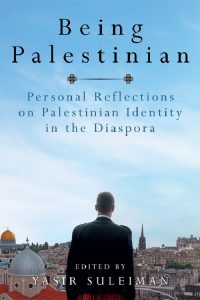Unser Allianz Gastprofessor (2004/05) Dr. Ibrahim Muhawi überließ dem Berichterstatter vor einiger Zeit dieses Buch, zu dem er selbst einen Beitrag geschrieben hat (>>> http://wp.me/pG3Ud-1lv).

102 Palestinenser, die in den USA und in Großbritannien im Exil leben, reflektieren ihr Leben in der Fremde. „Männer und Frauen, jung und alt, Christen und Muslime, bedeutende Akademiker, Dichter, Schriftsteller, Glaubensführer und Sänger offenbaren ihre teils verknäuelten Verbindungen zu ihrem „Zuhause“ und zum „Heimatland“ und decken auf, dass Palästina in der Diaspora gefunden oder verloren, geraubt und gefeiert, gelebt und herbeigesehnt werden kann“, wie der Verlag kommentiert.
Noam Chomsky sagt zum Buch: „These thoughtful, poignant reflections bring forth vividly some of the human dimensions of one of the great tragedies of current history, the forced dispossession of Palestinians from their homeland“.
Die Beiträge sind jeweils eingeleitet mit einem Foto und einer kurzen Vorstellung der Autorin oder des Autors. Ob rein sachlich oder anklagend, in poetischer oder nüchterner Sprache, immer berühren die Texte durch ihre Offenheit und Unmittelbarkeit.
Als besonders nahe gehendes und repräsentatives Beispiel sei hier das Gedicht der 1969 in Bethlehem geborenen und als eine der „wichtigsten Stimmen ihrer Generation“ beschriebene NATHALIE HANDAL (> ihre Website) wiedergegeben. Die Autorin lebte in Europa, Lateinamerika, den USA und in der Arabischen Welt.
Guide to Being Palestinian
If you are darker than most,
have a beard or wear a hijab,
it’s wise not to speak too loud
when you reach an airport or any exit.
If your father begged for his house,
was dragged away,
and returned the next day
without his eyes or his honour,
don’t judge him.
If your mother told you to watch
his humiliation,
it wasn’t to hurt you
but to help you
understand where you are from.
If you are exiled
don’t expect an open field,
a smile, a new home –
most likely you will always be a stranger.
Stand close enough to see their eyes,
far enough to protect your heart.
If you think you can write
about all the days you are missing
in your town or city,
think again –
it’s another’s myth now
and if you are afraid of forgetfulness,
apathy is even more dangerous.
If you take your longing
everywhere you go,
keep the keys to your old house
even if it’s inhabited by others –
it’s a clue you should also keep everything else:
the photos, the art, the folklore and even the stones.
If you laugh and feel guilty,
love and feel like you shouldn’t,
remember all aching begins with desire.
If your ancestors gave you a map of your country
but didn’t give you one for dispossession,
weave the distances with your history.
If our father calls you father – baba –
when you are his son or daughter,
asks you, you know the name ofyour birthplace?
answer in Arabic
even if you are told to speak it
only at home – for your safety.
And if the day comes
while far away
you are asked,
who gave you that name?
remember what matters
is that the land knows
your face, your voice,
the origin of your silence –
and that, what’s holy is alive
in who you are,
not in who you are told
you should be.
Yasir Suleiman (Hrsg.) Being Palestinian. Personal Reflections on Palestinian Identity in the Diaspora, mit einem Prolog des Herausgebers (Universität Cambridge) und einem Glossar, Edinburgh University Press 2016, 370 S., 244mm x 172mm, 120 s/w und farbige Abbildungen, ISBN 978-1-4744-0539-3, Paperback-Ausgabe 19,91 € (amazon). Es gibt auch ein e-book und eine gebundene Ausgabe.

